When I moved from New Jersey to Atlanta in January I taped up all but 2 books in boxes for the moving company. ‘Alexander Hamilton’ by Ron Chernow was placed directly in my car. For the first week or so in Atlanta it lay on the floor next to my sleeping bag – for I had no bed yet – and I’d bump against it in the night.
Why did I value the biography of Hamilton so highly? Why did it serve as my emotional support book in an unfamiliar city?
Hamilton inspired me because of his skill with words. He wrote with fervour. When he needed to hit back against the world – whether against injustice, stupidity or ignorance – he wrote.
I wish I had the intellectual and literary power Hamilton did.
***
It’s been tough-going these past few months. A lot of rejections, dead ends and worry about 2019. It’s not clear if I’ll get to stay in Atlanta…or even in America. I know I’m struggling to balance everything career-related in my life, and I can clearly see all the ways I’ve made life harder for myself recently. But if I want to live 2019 on my own terms…I need to persist. So I figured I may as well summarise some of my achievements from 2018. I could do with the self-encouragement.
First paid ($$$) pieces of science writing
Thanks to a call-out on Twitter I learned that Chemistry World magazine was looking for writers for its Last Retort column (lighthearted, humorous opinion pieces connected to life as a scientist). I’d spent the latter half of 2017 writing science features article for Rutgers Daily Targum, and was surprised that my (unpaid & amateur) contributions to a student newspaper counted as sufficient leverage to get into a print magazine with 50,000 international subscribers. But it did. And I got repeat commissions.
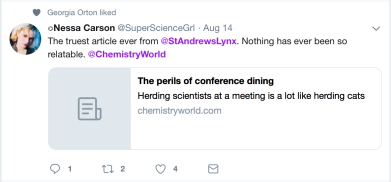
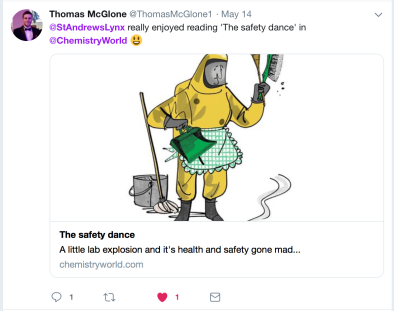

There is an ego boost that comes from seeing others share and quote lines from your articles. Especially since I was trying to be funny and memorable.
Editor role at Emory Postdoc Science Writers Magazine
Emory Postdoc Science Writers is one of those official university organisations that floats in and out of existence. It was very active a couple of years back, but then its leadership got jobs and left. Having already got those science writing clips from Rutgers (seriously, I’m getting a lot of mileage out of my student newspaper work) I was asked to take charge of the Science Writers Magazine. Several years had passed since the last issue, and I was re-starting the enterprise from scratch.
We got 2 magazine issues out the door: one per semester. I got enough people on board (~10 writers and a few editors) to create something you could define as a magazine. The postdocs enjoyed the opportunity to practice their non-academic science writing. I got to learn about some new areas of research.
Communications Pro. Communications Promotion
I joined Women In Bio-Atlanta mid-way through the year and offered to help out on the Communications Committee. More words and writing! Having an identity as a scientist/white collar professional outside my academic ecosystem wasn’t something I really had during my PhD (though I could have searched for one), so it’s nice to be around a mix of scientists and science-adjacent professionals who happen to work in my city.

Supper club

End-of-summer networking
Following the winter leadership rollover I was asked to become Co-Chair of the Communications committee. So I know I’ve been doing something at least partially right.
I helped someone else double their income ($$$ x2)
The Postdoc Science Writers (see above) invited a communications coach to come and give a science writing workshop at Emory, which I helped organise. She was flying in from the Midwest and wanted to extend her stay, so asked us if we had any contacts at the other universities in town who might be interested in hosting her. Well, I had access to an Excel spreadsheet of Atlanta university administrators thanks to my Communications role in Women In Bio (see above). I sent out emails. One of my contacts was interested in hosting a workshop.
People often ask themselves “What am I worth [to this person]?” I’m now able to point to someone and say, “Well, to that person I’m worth several thousand dollars.”
I made *more* money off my writing ($$$)
In addition to my humour/opinion pieces, I started pitching ideas for other articles to online science publications. These were serious science writing venues, where I had to pitch against a crowd. One of my science article ideas was accepted. Then after a couple of editorial revisions it was killed. My pride was wounded, but they paid me a 50% ‘kill fee.’ Another feature article is under editorial revisions right now – I’m not past the Editorial Kill-zone yet, but there’s less to worry about since the topic was a little less ambitious, so less subject to change/disappointment. That one will also be a paid, serious, journalistic piece.
I also launched into healthcare marketing and a couple of freelance writing project there: white papers, press releases, etc. I also drew repeat commissions with my work for legit healthcare companies, which I found hard to believe. One person this year offered me “exposure” as compensation for writing some blog posts for them. Now I’m at the point where people are offering me CASH for my writing…and I’m fine with that.
You need experience to get experience. This year I started getting that experience. In 2019 I should build momentum (and savings).
Four belt promotions in martial arts
I’ve done over 200 hours of karate & jujitsu this year. I’ve gone from a total beginner/white belt to yellow then blue belt in both disciplines. I’m not the fittest, strongest, most coordinated, flexible or skilled martial artist – in fact my natural ability in most of those categories is low. But I’m persisting. And I can see the persistence slowly paying off.
Atlanta and The Diner
On my first ever morning in Atlanta I knotted myself into a ball on a park bench. It was a pitch black winter morning, the bench was cold and wet, and my clothes weren’t wintery enough. I was waiting for the breakfast diner across the street to open.
A sense of belonging comes in many forms. I can point my finger and say: “Women In Bio (well-educated urban professionals operating in the sciences – like myself) are my people.” I can point my finger again and say: “The fellow martial artists at my dojo (whole spectrum of educational & lifestyle backgrounds, but we’re all intensely dedicated to the same thing, and I can make them laugh) are my people.” I can also walk into a diner once per week for a whole year, be nodded to My Seat(TM) and asked if I want my usual(s), sip my endlessly refilled mug of coffee and say: “This diner is my place, and these are my people too.”
I’ve moved to many new places. None of them come with a guarantee of happiness and belonging. It’s never guaranteed that I will fit in. Belonging takes time and effort. Belonging is an achievement. But even if you only get 1 year in a city, you’ll never regret finding your people there.
***
I wish things were easier and I didn’t have to shrug off so many rejections, uncertainties and setbacks.
At least I don’t have to waste much time thinking to myself “Well, what would Alexander Hamilton do, if he were in my position?”
I know the answer to that one already.
He’d write.
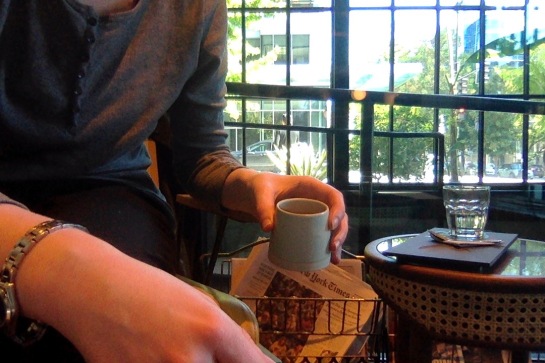



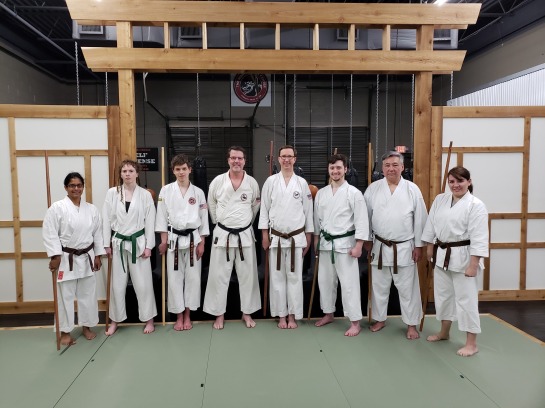
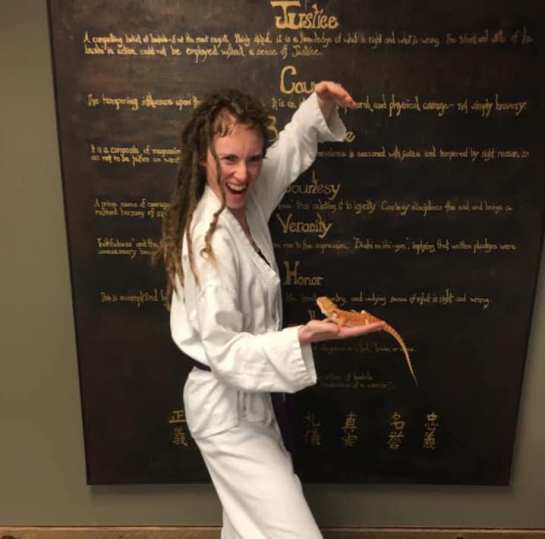 I realise this photograph raises more questions than it answers. But as we say in Okinawan Shuri-Ryu: ‘Karate is my secret.‘
I realise this photograph raises more questions than it answers. But as we say in Okinawan Shuri-Ryu: ‘Karate is my secret.‘




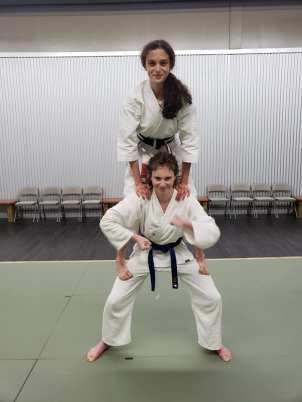


 One line of my piece was censored: I originally wrote “lessons are an ‘Open Mike’ session against the teachers.” Which was a reference to an incident involving a teacher named Mike that local newspapers & tabloids feasted on…and I’m still annoyed my line was mangled. Let this be a correction to the record.
One line of my piece was censored: I originally wrote “lessons are an ‘Open Mike’ session against the teachers.” Which was a reference to an incident involving a teacher named Mike that local newspapers & tabloids feasted on…and I’m still annoyed my line was mangled. Let this be a correction to the record.